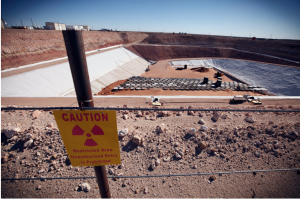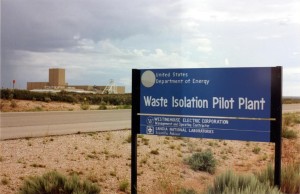
At Waste Control Specialists radioactive waste disposal pit in Andrews, Tex., space inside goes for $10,000 a cubic foot in some cases. As aging nuclear reactors retire, their most radioactive steel, concrete and other components must be shipped somewhere for burial. Photo by Michael Stravato, The New York Times
Texas is under radioactive waste assault. There is already an existing “low-level” radioactive waste dump owned by Waste Control Specialists (WCS) in Andrews County. Weapons waste from Fernald, Ohio is already buried in one of the three pits there. The facility is now taking nuclear reactor waste from around the country and is accepting Department of Energy waste, including nuclear weapons waste. And there is an adjacent hazardous waste pit, which can accept some 2000 chemicals, many of the toxic or corrosive. WCS expects to make some $15 billion off the site, although Texans bear the risks of contamination and financial liability.
All of this is at a site for which Texas Commission on Environmental Quality (TCEQ) staff originally recommended denial of the license due to concerns about water contamination. There are 2 water bodies are present at the site, the the most significant of which is the southern tip of the massive Ogallala Aquifer. Although some maps have been drawn to show that the aquifer doesn’t extend as far as the WCS disposal site, water has been present in up to 40% of the monitoring wells on the site, indicating that a hydrological connection could exists. The site is supposed to be dry for safety reasons, but that hasn’t stopped the TCEQ from granting permits or WCS from burying radioactive waste there.
Now two new threats have emerged, including storage of very hot transuranic waste – which includes plutonium, neptunium, and americium from the failed national repository known as the Waste Isolation Pilot Project (WIPP) site.
Texas is getting the transuranic waste unexpectedly. The Waste Isolation Pilot Project (WIPP) site in Carlsbad, New Mexico, is a disposal site for transuranic waste that is buried half a mile underground. The site had a fire on February 5th and a major radiation leak 9 days later. At least 21 workers were exposed to radiation. The New Mexico facility has been closed since the accident and the WCS radioactive waste dump in Andrews County, Texas is now taking this same highly radioactive waste and storing it above ground in steel sided buildings, raising concerns about what would happen if there were tornadoes, floods or wildfires.
In addition, now Governor Perry is actively campaigning to bring spent nuclear fuel to Texas for storage. This the hottest, most dangerous of radioactive waste, the kind that was to be sent to the failed Yucca Mountain site in Nevada.
It is so dangerous that shielding is required to protect humans from a lethal dose as a result of exposure to spent nuclear fuel. Even 10 years after this waste is removed from a spent fuel pool, the radiation field at one meter away is 20,000 rem/hour. It only takes a quarter of that amount to incapacitate a person immediately and cause the person’s death within one week.
The spent fuel is currently cooled and then kept in dry casks at the sites where it was generated. Storing the waste at the power plant sites raises the risks for people living in those areas, but transporting the waste to a central location increases risks for those living along transportation routes and those near the disposal site. There is simply no safe way to deal with the amount of radioactive waste we are producing in the long term.
The Texas House Environmental Regulation Committee will soon address an interim charge on how to bring this high-level waste to Texas and how much economic benefit there could be. Discussion of the risks isn’t on the agenda. It seems that the committee may be blinded by potential profit for their campaign donors.
Stay tuned and learn more at www.NukeFreeTexas.org (more…)




